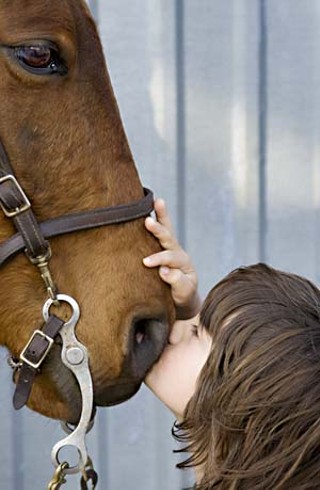TV Eye
Alternative Healing
By Belinda Acosta, Fri., May 7, 2010

Central Texans are making their presence known on PBS' Independent Lens series as of late. Michel Orion Scott's locally produced The Horse Boy, the next film in the series, features an ordinary family going through an extraordinary event in the name of love.
Living in rural Elgin, writer Rupert Isaacson and his wife Kristin Neff have a good life. When their son Rowan was born, life only seemed to be getting better. But around age 2, things started to change. Milestones that most parents take for granted in the developmental process of their children – language, expression of affection, interaction with other children, and potty training – were not occurring. Rowan would have inconsolable tantrums for no apparent reason and was becoming more aloof and withdrawn. The diagnosis: Rowan had autism. Upon hearing the news, Rupert Isaacson felt like he'd "been hit in the face with a baseball bat."
Country life would seem like an ideal place to raise a family, but as soon as the couple discovered they had a special-needs child, suddenly the world seemed very dangerous. Rupert, a former horse trainer, stopped riding horses and kept his son away from them, fearing for Rowan's safety. The day Rowan managed to run away from his father and joined a small herd of horses in their neighbor's pasture, Rupert was sure his young son's wild behavior would get him trampled. Instead, the lead horse acquiesced to the boy, nudging him affectionately. Rupert didn't know what was happening, but he could see there was a connection between his child and the horse, and he wanted to explore that interaction.
Autism "is the fastest-growing developmental disability today," according to press materials. It's estimated that diagnosed cases of the condition "in the U.S. alone ... could reach four million in the next decade." There is no cure. Rupert knows this. His wife, Kristin, a University of Texas psychology professor, knows this. And yet, when Rupert came up with the idea to take their son to the remote regions of Mongolia to explore alternative therapies, it was an outrageous and inspired scheme – one which would turn into the adventure of a lifetime.
The Horse Boy – which won the Audience Award at South by Southwest '09 under its previous title Over the Hills and Far Away – follows Rupert, Kristin, and Rowan as they make their grand journey across Mongolia. To an outsider, the trip might seem ridiculous and even dangerous. But what rings true in the film, and with such touching candor, is the depth of love that these parents feel for their child and their desire to do whatever is necessary to help him. If flying to the moon were to provide a cure, I feel certain these parents would do it. If eating dirt were the answer, they would do that too. Rupert doesn't know why horses calm his son or why the horses seem to care for his boy. All he knows is that something powerful is happening. Given the opportunity and ability, what parent wouldn't take a two-day horse ride in a remote region of the world if there were any hope of helping their child?
Intercut within The Horse Boy are interviews with autism experts, including Dr. Temple Grandin (portrayed in an HBO biopic by Claire Danes earlier this year). Grandin herself has autism and is one of the top experts in animal behavior. But The Horse Boy is much more than a "disability of the week" film. It's an exploration of parenting and patience and an appreciation of the intangible, the unexplainable. When it's all said and done, Rowan is not "cured" of his autism, but his behavior and his ability to interact in the world are most definitely (even miraculously) improved far beyond what could be expected with Western therapies. Is it a miracle, good luck, faith, or something else? I'm not sure it matters. But the one thing that leaps from the screen and into your chest when you watch The Horse Boy is that Rupert Isaacson and Kristin Neff love their son with their entire heart, soul, and body. And no skepticism can ever dismiss that.
The Horse Boy airs as part of the Independent Lens series on Tuesday, May 11, at 9pm on PBS.
As always, stay tuned.
Follow TV Eye on Twitter: @ChronicleTVEye. E-mail Belinda Acosta at [email protected].










